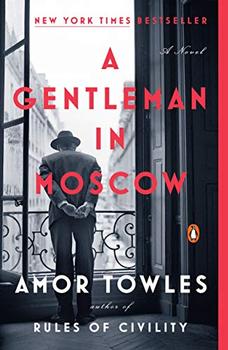Summary | Excerpt | Reading Guide | Reviews | Beyond the Book | Readalikes | Genres & Themes | Author Bio

"Your soup," said the Bishop."Ah. Thank you, my good man. It looks delicious. But don't forget the wine!"
"Of course."
Turning his attention to his okroshka, the Count could tell at a glance that it was a commendable execution—a bowl of soup that any Russian in the room might have been served by his grandmother. Closing his eyes in order to give the first spoonful its due consideration, the Count noted a suitably chilled temperature, a tad too much salt, a tad too little kvass, but a perfect expression of dill—that harbinger of summer which brings to mind the songs of crickets and the setting of one's soul at ease.
But when the Count opened his eyes, he nearly dropped his spoon. For standing at the edge of his table was the young girl with the penchant for yellow—studying him with that unapologetic interest peculiar to children and dogs. Adding to the shock of her sudden appearance was the fact that her dress today was in the shade of a lemon.
"Where did they go?" she asked, without a word of introduction.
"I beg your pardon. Where did who go?"
She tilted her head to take a closer look at his face.
"Why, your moustaches."
The Count had not much cause to interact with children, but he had been raised well enough to know that a child should not idly approach a stranger, should not interrupt him in the middle of a meal, and certainly should not ask him questions about his personal appearance. Was the minding of one's own business no longer a subject taught in schools?
"Like swallows," the Count answered, "they traveled elsewhere for the summer."
Then he fluttered a hand from the table into the air in order to both mimic the flight of the swallows and suggest how a child might follow suit.
She nodded to express her satisfaction with his response.
"I too will be traveling elsewhere for part of the summer."
The Count inclined his head to indicate his congratulations.
"To the Black Sea," she added.
Then she pulled back the empty chair and sat.
"Would you like to join me?" he asked.
By way of response, she wiggled back and forth to make herself comfortable then rested her elbows on the table. Around her neck hung a small pendant on a golden chain, some lucky charm or locket. The Count looked toward the young lady's governess with the hopes of catching her attention, but she had obviously learned from experience to keep her nose in her book.
The girl gave another canine tilt to her head.
"Is it true that you are a count?"
"'Tis true."
Her eyes widened.
"Have you ever known a princess?"
"I have known many princesses."
Her eyes widened further, then narrowed.
"Was it terribly hard to be a princess?"
"Terribly."
At that moment, despite the fact that half of the okroshka remained in its bowl, the Bishop appeared with the Count's filet of sole and swapped one for the other.
"Thank you," said the Count, his spoon still in hand.
"Of course."
The Count opened his mouth to inquire as to the whereabouts of the Baudelaire, but the Bishop had already vanished. When the Count turned back to his guest, she was staring at his fish.
"What is that?" she wanted to know.
"This? It is filet of sole."
"Is it good?"
"Didn't you have a lunch of your own?"
"I didn't like it."
The Count transferred a taste of his fish to a side plate and passed it across the table. "With my compliments."
She forked the whole thing in her mouth.
"It's yummy," she said, which if not the most elegant expression was at least factually correct. Then she smiled a little sadly and let out a sigh as she directed her bright blue gaze upon the rest of his lunch.
"Hmm," said the Count.
Retrieving the side plate, he transferred half his sole along with an equal share of spinach and baby carrots, and returned it. She wiggled back and forth once more, presumably to settle in for the duration. Then, having carefully pushed the vegetables to the edge of the plate, she cut her fish into four equal portions, put the right upper quadrant in her mouth, and resumed her line of inquiry.
Excerpted from A Gentleman in Moscow by Amor Towles. Copyright © 2016 by Amor Towles. All rights reserved. No part of this excerpt may be reproduced or reprinted without permission in writing from the publisher.




The thing that cowardice fears most is decision
Click Here to find out who said this, as well as discovering other famous literary quotes!
Your guide toexceptional books
BookBrowse seeks out and recommends the best in contemporary fiction and nonfiction—books that not only engage and entertain but also deepen our understanding of ourselves and the world around us.